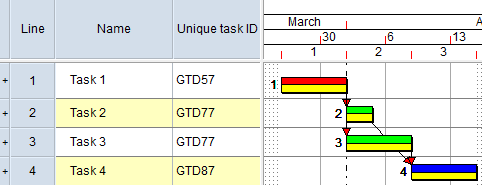'Unique task IDs' quality metric
Use the 'unique task IDs' metric to check the proportion of tasks that have exclusive unique task IDs - unique task IDs that are not shared with any other tasks. If a unique task ID is used by more than one task, this can indicate errors in scheduling.
For a project to fail this metric, you must have configured unique task IDs so that they are not forced to be unique, by clicking the Not unique radio button on the Unique Task ID Numbering dialog. If you have configured unique task IDs so that they are forced to be unique, the project will never fail this metric.
If you select 'Separate results' in the Results field, on the Scope tab of the Quality Check Properties dialog, unique task IDs are checked for uniqueness within each individual branch of the project that is included in the quality check scope; if you select 'Combine results' in this field, unique task IDs are checked for uniqueness across the entire scope of the quality check.
With the pass and fail boundaries set to 100.00%, this metric meets the requirements of CIOB stress test 13 (Unique identifiers).
In the following illustration, Task 2 and Task 3 have the same unique task ID - 'GTD77'. Both tasks would fail this metric:

You can change the impact that this metric has on the weighted total result of a quality check by entering a factor by which the quality metric should be multiplied in the Weighting field. For the weighting to have any effect, a quality check must have more than one quality metric.
Pass and fail criteria
| Pass or fail? | Criteria |
|---|---|
| Pass |
A project passes this metric if the percentage of tasks that have exclusive unique task IDs is greater than or equal to the pass boundary percentage.
For example, if the pass boundary was set to 100.00%, a project would pass this metric if 100.00% of tasks had exclusive unique task IDs. |
| Fail |
A project fails this metric if the percentage of tasks that have exclusive unique task IDs is less than the fail boundary percentage.
For example, if the fail boundary was set to 100.00%, a project would fail this metric if less than 100.00% of tasks had exclusive unique task IDs. |
| Neither pass nor fail | If the percentage of tasks that have exclusive unique task IDs falls between the pass and fail boundary percentages, the result is neither a pass nor a fail, but somewhere in between. |
Suggested settings to meet the requirements of CIOB stress test 13 (Unique identifiers)
- Pass boundary: 100.00%. A project will pass this metric if all tasks have exclusive unique task IDs.
- Fail boundary: 100.00%. A project will fail this metric if any tasks share a unique task ID with one or more other tasks.
The following table shows whether some example projects would pass or fail this metric using these settings:
| Percentage of tasks with exclusive unique task IDs | Pass or fail? |
|---|---|
| 0.00% | Fail |
| 50.00% | Fail |
| 99.99% | Fail |
| 100.00% | Pass |
Does the metric force a project to be rescheduled?
No
Suggested actions if a project fails this metric
If a project fails this metric, select the metric in the Quality Check Results dialog and click Show Failing Tasks to view the tasks that have failed the metric.
You could take the following actions to remedy the failing tasks:
- Edit the unique task IDs of the failing tasks, ensuring that they are unique.
- Renumber the unique task IDs in the project.